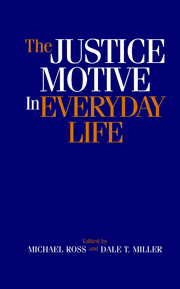Book contents
- Frontmatter
- Contents
- List of Contributors
- Introduction
- Theoretical Perspectives on the Justice Motive
- Victim Derogation and the Belief in a Just World
- 7 Why We Reject Innocent Victims
- 8 Helping and Rationalization as Alternative Strategies for Restoring the Belief in a Just World: Evidence from Longitudional Change Analyses
- 9 Violence in the Workplace – The Explanatory Strength of Social (In)Justice Theories
- 10 The Just World and Winston Churchill: An Approach/Avoidance Conflict about Psychological Distance When Harming Victims
- The Justice Motive and Prosocial Behavior
- Justice-Based Reactions to Transgressors
- Justice and Reaction to One's Own Fate
- Name Index
- Subject Index
7 - Why We Reject Innocent Victims
Published online by Cambridge University Press: 08 September 2009
- Frontmatter
- Contents
- List of Contributors
- Introduction
- Theoretical Perspectives on the Justice Motive
- Victim Derogation and the Belief in a Just World
- 7 Why We Reject Innocent Victims
- 8 Helping and Rationalization as Alternative Strategies for Restoring the Belief in a Just World: Evidence from Longitudional Change Analyses
- 9 Violence in the Workplace – The Explanatory Strength of Social (In)Justice Theories
- 10 The Just World and Winston Churchill: An Approach/Avoidance Conflict about Psychological Distance When Harming Victims
- The Justice Motive and Prosocial Behavior
- Justice-Based Reactions to Transgressors
- Justice and Reaction to One's Own Fate
- Name Index
- Subject Index
Summary
In our daily lives, we are often confronted with individuals who suffer through little fault of their own. Common activities such as reading the newspaper, watching television, and walking down a crowded city street can expose us to instances of misfortune. These scenes are inescapable. Responses to these images, however, vary greatly – from sympathy and offers of help to derogation of the victims' character and behavior. The research presented in this chapter focuses on our tendency, under certain circumstances, to reject victims of misfortune – our tendency, for example, to derogate their character, to blame them for their fate, and to psychologically disassociate ourselves from their plight. In a series of experiments in the 1960s and 1970s, Melvin Lerner and his colleagues addressed the tendency for observers, under certain conditions, to reject victims of innocent suffering (for a review, see Lerner & Miller, 1978). Lerner concluded from this work that people need to believe that the world is a just place, a place where individuals get what they deserve. Certain victims pose a threat to the belief in a just world (BJW) by providing information to the contrary. Strategies for coping with such a threat include attempts to restore justice by alleviating the suffering or providing compensation. Observers might also cope with innocent suffering by rejecting the victim.
- Type
- Chapter
- Information
- The Justice Motive in Everyday Life , pp. 109 - 126Publisher: Cambridge University PressPrint publication year: 2002
- 23
- Cited by

